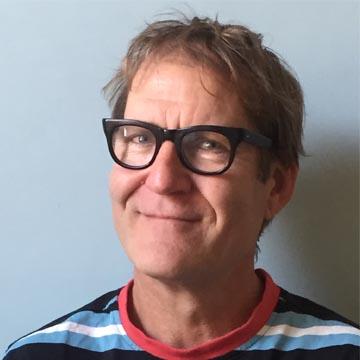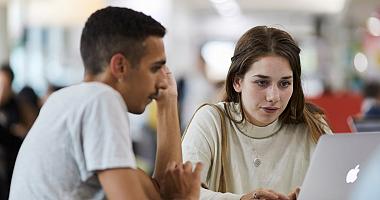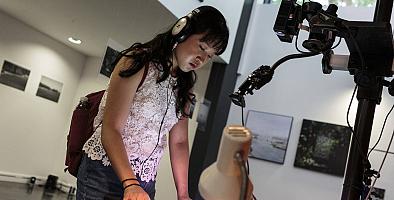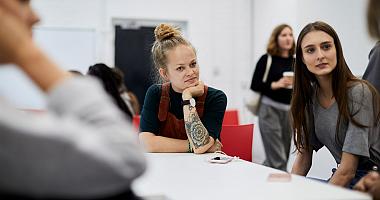BA (Hons)
Anthropology & Visual Practice
Develop hands-on digital production skills alongside an understanding of anthropology, and creatively challenge contemporary media representations.
Content navigation menu
Why study BA Anthropology & Visual Practice at Goldsmiths
- The degree will develop your understanding of vital contemporary cultural issues, alongside which you'll acquire practical skills in visual practice and research methods.
- You’ll receive hands-on training in a range of digital production skills, including photography, videography and editing. These skills will complement your theoretical study, and prepare you for multiple career opportunities when you graduate.
- Anthropology at Goldsmiths is approached from a fresh perspective that differs from the 'traditional anthropology' taught at other universities. You'll also have the opportunity to investigate the subject in relation to media, politics, gender theory, philosophy and psychology, bringing an interdisciplinary focus to your work.
- You'll explore contemporary links between theoretical issues and ethnographic studies, enabling you to think critically about your own culture and society, and to apply knowledge learned in lectures to your everyday life.
- What you learn in the classroom will be directly relevant in a variety of public domains, in Britain, and around the world.
- Our graduates have gone on to work for the media, visual arts, UN, World Bank, NGOs, law companies and corporate social responsibility (CSR) consultancies, and pursue careers in activism and advocacy. Others have gone on to pursue academic careers.
Contact the department
If you have specific questions about the degree, contact Dr Christopher Wright.
UCAS code
1T67
Entry requirements
A-level: BBB
BTEC: DDM
IB: 33 points overall with Three HL subjects at 655
Length
3 years full-time
Fees
Home - full-time: £9250
International - full-time: £20160
Department
Watch videos about your course
Degree overview
During the first two years of the degree you'll concentrate on foundational anthropological concepts – such as ecology, kinship, politics, economics and religion, world systems and development – and on methods of studying and analysing them. You will also study ethnography and at least one region of the world in depth.
There's also a substantial practical component to the degree, and you will produce at least two pieces of visual/digital creative work per term. This includes training in:
- Photography
- Videography
- Digital editing
- Specialist software
- Sound recording/podcasts
In your final year you can specialise by choosing from a selection of option topics. You will also produce a final audiovisual project and dissertation based on individual study.
You'll finish your degree with a portfolio of work that demonstrates your cross-disciplinary skills to potential employers.
What you'll study
Year 1
Compulsory modules
You'll take the following compulsory modules:
| Module title | Credits |
|---|---|
| Introduction to Visual Practice | 30 credits |
| Approaches to Contemporary Anthropology | 30 credits |
| Anthropological Methods | 15 credits |
| Ethnographic Film | 15 credits |
| Advancing your Anthropology | 15 credits |
Optional modules
You'll also choose one of these optional modules:
| Module title | Credits |
|---|---|
| Anthropological Ideas | 15 credits |
| Being Related | 15 credits |
Note about optional modules (if available): The above is indicative of the typical modules offered, but is not intended to be construed or relied on as a definitive list of what might be available in any given year. The module content and availability is subject to change.
Teaching style
This programme is taught through scheduled learning – for example, through a mixture of lectures, seminars and workshops. You'll also be expected to undertake a significant amount of independent study. This includes carrying out required and additional reading, preparing topics for discussion, and producing essays or project work.
How you'll be assessed
You’ll be assessed by a variety of methods, depending on your module choices. These may include coursework, examinations, group work and projects.
Credits and levels of learning
An undergraduate honours degree is made up of 360 credits – 120 at Level 4, 120 at Level 5 and 120 at Level 6. If you are a full-time student, you will usually take Level 4 modules in the first year, Level 5 in the second, and Level 6 modules in your final year.
Careers
The digital skills training that is central to the degree is increasingly relevant to many employment fields that students go on to work in, and the ability to critically assess and creatively produce digital media content is a vital skill in many workplaces.
Our graduates have been successful in a range of careers, with many going on to be visual practitioners of various kinds. Job roles and employers include:
- Archive Producer on a BAFTA-winning BBC series about the New Cross fire
- Migrant and homeless support service work in Lewisham
- Documentary filmmaking with support from the National Lottery, Sundance Institute and BFI
- Making shorts for BBC News and the BBC
- Working with award-winning production company Raw TV for CNN
- Co-founding an NGO to teach young girls coding skills
More widely our former students are working in areas including:
- Advocacy
- Filmmaking
- The media and journalism
- Teaching
Our particular emphasis on public anthropology encourages our students to explore options in a range of practice-based and public sector career paths.
Find out more about the types of jobs you can get with an anthropology degree.
Skills
The BA Anthropology & Visual Practice degree will equip you with a range of specialist and transferable skills.
As part of your studies, seminars and course work, you'll develop skills in:
- Digital production including photography, videography and editing
- Industry-standard software such as Adobe
- Analytical thinking
- Communication (including public speaking, developing and presenting an argument, note taking, report writing)
- Awareness of social and cultural differences
- Understanding human behaviour
- Thinking 'outside the box'
- Research and evaluation
- Open mindedness
The digital skills that are taught and the kinds of creativity encouraged and instilled through the programme serve as a strong foundation for students to continue to develop their own critical media practices.
Entry requirements
We accept the following qualifications:
A-level: BBB
BTEC: DDM
International Baccalaureate: 33 points overall with Three HL subjects at 655
Access: Pass with 45 Level 3 credits including 30 Distinctions and a number of merits/passes in subject-specific modules
Scottish qualifications: BBBBC (Higher) or BBC (Advanced Higher)
European Baccalaureate: 75%
Irish Leaving Certificate: H2 H2 H2 H2
We don't assume you have any knowledge of anthropology, and welcome applications from anyone with arts, social studies or science backgrounds.
Alternative qualifications and experience
See our full list of undergraduate entry qualifications.
We welcome students with a range of educational experiences. If you believe you may not meet the standard qualification requirements we would still encourage you to apply because we consider all aspects of your application when making a decision.
We’ll pay particularly careful attention to your personal statement, which is your opportunity to demonstrate your interest in the subject you’ve applied for. Your referees are also welcome to include any relevant contextual comments around your academic achievements. We’ll look at all these things when making a decision on your application, as well as your qualifications and grades.
International qualifications
We also accept a wide range of international qualifications. Find out more about the qualifications we accept from around the world.
If English isn’t your first language, you will need an IELTS score (or equivalent English language qualification) of 6.0 with a 6.0 in writing and no element lower than 5.5 to study this programme. If you need assistance with your English language, we offer a range of courses that can help prepare you for degree-level study.
Fees and funding
Annual tuition fees
These are the UG fees for students starting their programme in the 2024/2025 academic year.
From August 2021 EU/EEA/Swiss nationals will no longer be eligible for 'Home' fee status. EU/EEA/Swiss nationals will be classified as 'International' for fee purposes, more information can be found on our fees page.
- Home - full-time: £9250
- International - full-time: £20160
If your fees are not listed here, please check our undergraduate fees guidance or contact the Fees Office, who can also advise you about how to pay your fees.
It’s not currently possible for international students to study part-time if you require a Student Visa, however this is currently being reviewed and will be confirmed in the new year. Please read our visa guidance in the interim for more information. If you think you might be eligible to study part-time while being on another visa type, please contact our Admissions Team for more information.
If you are looking to pay your fees please see our guide to making a payment.
Funding opportunities
We offer a wide range of scholarships and bursaries, and our Careers Service can also offer advice on finding work during your studies. Find out more about funding your studies with us.
Additional costs
In addition to your tuition fees, you'll be responsible for any additional costs associated with your course, such as buying stationery and paying for photocopying. You can find out more about what you need to budget for on our study costs page.
There may also be specific additional costs associated with your programme. This can include things like paying for field trips or specialist materials for your assignments. Please check the programme specification for more information.






